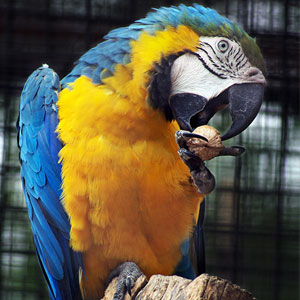
Feeding Your Bird: Seeds vs. Pellets
If we ate the same meal every day, we wouldn't receive the necessary nutrients to stay healthy. Variety is the best way to ensure that we receive all the nutrients that we need. Does your bird's diet consist of picking out his favorite seeds? Birdseed has been the traditional food for birds for years, especially for wild birds that forage for their own seeds. However, birds in the wild eat a lot more than just seeds. They eat a variety of foods, including nuts, grasses, flowers, fruits, and insects. Pelleted food is a relatively new idea that has gained popularity over the years. A bird's diet is crucial for his overall health, so it's important to know the difference between seeds and pellets.
Seed Diets
Birds tend to love seeds; however, seeds alone do not provide a complete diet for your feathered friend. In general, seeds are high in fat and low in important vitamins and minerals, making them the "junk food" of a bird's diet. Even in the most nutritionally complete seed diets, birds tend to pick out their favorites, leaving essential nutrients behind.The key to seed diets? Variety. Give your bird a mixture of seeds, nuts, fruits and vegetables that are fortified with nutrients; make sure that he eats a variety of everything. This can help your bird maintain the proper balance to stay healthy. Supplements might also be necessary to ensure that your bird receives all his needed vitamins and minerals.
Formulated Diets
Pellets are formulated diets made specifically for the needs of each bird type. They contain a blend of grains, seeds, fruits, and vegetables. Pellets also include all of the needed levels of vitamins, minerals, proteins, fats, and other nutrients that your bird needs. The tasty flavors and enticing smells encourage your bird to eat. Since the pellets are a blended mix and baked together, your bird can't pick out his favorite pieces, meaning he gets balanced nutrition in every bite.Pellets also provide less of a mess than seeds, which produce messy hulls everywhere. However, if your bird is used to seeds, it can be difficult to transition him to a pelleted diet; it's best to start feeding your bird pellets while he's still young.
The diet you choose may depend on your bird's preferences and eating habits. If your bird continually picks out his favorite pieces from his seed diet, you might want to feed a pelleted diet instead to make sure he's receiving the right nutrients. Keep track of your bird's health and behavior, and if you start to notice problems or deficiencies, contact your veterinarian.
Discover More!
How to Switch Your Bird From Seeds to PelletsTips for Feeding Your Bird
Pet Bird Nutrition
Return to Bird Articles


